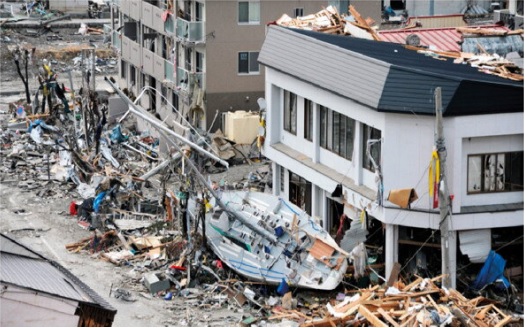Nội dung bài học Unit 4 Our planet phần Grammar sách Tiếng Anh 10 Chân trời sáng tạo sẽ hướng dẫn các em cấu trúc So sánh nhất và cách dùng của too và enough trong câu. Với kiến thức được HOC247 trình bày chi tiết, hi vọng bài học này sẽ giúp các em mở rộng và học hỏi nhiều kiến thức bổ ích!
Tóm tắt bài
1.1. Unit 4 Lớp 10 Grammar 2 Task 1
Describe the photo. What do you think happened? Use the words below to help you.
(Miêu tả bức tranh. Bạn nghĩ chuyện gì đã xảy ra? Sử dụng các từ bên dưới để giúp bạn.)

Guide to answer
There was a tsunami and a wave lifted the ship, and carried it onto dry land. (Đã có một trận sóng thần và một con sóng nhấc bổng con thuyền lên và mang vào đất liền.)
1.2. Unit 4 Lớp 10 Grammar 2 Task 2
Read the text and check your answers from exercise 1.
(Đọc bài khóa và kiểm tra câu trả lời của bạn trong bài 1.)
|
The Tohoku earthquake in 2011 was the most powerful earthquake ever in Japan and the fifth most powerful in the world. The earthquake happened 70 km from the coast, but it caused one of the biggest tsunamis ever recorded. The wave was over 40 m high and was large enough to travel 10 km inland in some places. The worst damage was in coastal towns where the land was flat. Some people managed to go to places high enough to be safe, but others weren't so lucky and didn't have enough time to escape. More than 18,000 people lost their lives. The wave also damaged the nuclear power station at Fukushima. Some people say that the power station was too close to the sea. The Prime Minister of Japan said, 'In the 65 years since the end of World War II, this is the toughest and the most difficult crisis for Japan. |
Tạm dịch
Trận động đất Tohoku vào năm 2011 là trận động đất mạnh nhất từ trước đến nay ở Nhật Bản và là trận mạnh nhất thứ năm trên thế giới. Trận động đất xảy ra ở nơi cách bờ biển 70km, nhưng nó gây ra một trong những đợt sóng thần lớn nhất từng ghi nhận. Cơn sóng cao hơn 40m và đủ lớn để có thể tiến sâu 10km vào đất liền ở một số nơi. Thiệt hại tệ nhất là ở những thị trấn bên bờ biển, nơi mà địa hình bằng phẳng. Một vài người đã cố gắng di tản đến những nơi đủ cao để được an toản, nhưng những người khác không quá may mắn và cũng không có đủ thời gian để trốn thoát. Hơn 18000 người đã thiệt mạng. Cơn sóng cũng đã gây thiệt hại cho nhà máy năng lượng hạt nhân tại Fukushima. Vài người cho rằng nhà máy quá gần biển. Thủ tướng Nhật Bản phát biểu,”Đây là khủng hoảng khó khăn và khắc nghiệt nhất cho Nhật Bản sau 65 năm kể từ khi kết thúc Thế chiến thứ hai.”
1.3. Unit 4 Lớp 10 Grammar 2 Task 3
Read the Learn this! box. Then study the highlighted superlative forms in the text and match them with the rules.
(Đọc hộp Learn this! Sau đó nghiên cứu các dạng so sánh nhất được tô nền trong bài khóa và nối chúng với các quy tắc.)
|
LEARN THIS! Superlative adjectives a. We add -est to short adjectives. (Chúng ta thêm -est vào các tính từ ngắn.) rich – richer – richest slow -slower -slowest b. Sometimes the spelling changes. (Đôi khi cách viết có thể thay đổi.) foggy- foggier – the foggiest hot - hotter - the hottest c. We put the most before long adjectives. (Chúng ta thêm most vào trước các tính từ dài.) dangerous - more dangerous - the most dangerous d. There are a few irregular comparative forms. (Cũng có một vài dạng so sánh bất quy tắc.) good - better- the best bad - worse - the worst for- further - the furthest e. We can use of after superlative adjectives. (Chúng ta có thể dùng of sau dạng so sánh nhất.) the sunniest day of the week f. We use in (not of) with nouns for groups or places. (Ta dùng in (không phải of) cho các danh từ dùng cho nhóm hoặc nơi chốn.) the tallest boy in the class the biggest lake in the world |
Guide to answer
a. the toughest
b. the biggest
c. the most powerful; the most difficult
d. the worst
e. one of the biggest tsunamis
f. the most powerful (earthquake ever) in Japan; the (fifth) most powerful in the world
1.4. Unit 4 Lớp 10 Grammar 2 Task 4
Complete these earthquake facts using the superlative form of the adjectives in brackets.
(Hoàn thành các sự thật về động đất sử dụng dạng so sánh nhất của các tính từ trong ngoặc.)
1. The largest (large) earthquake ever recorded was in Chile in 1960 (magnitude 9.5)
2. _____ (deadly) earthquake happened in 2004 in Indian Ocean. About 230,000 people died.
3. _____ (deep) earthquake recorded occurred 450 km below the surface of the Earth.
4. Antarctica is the continent with (small) _____number of earthquakes.
5. The (destructive) _____ earthquake ever recorded was in 1906 in San Francisco.
Guide to answer
1. The largest earthquake ever recorded was in Chile in 1960 (magnitude 9.5).
2. The deadliest earthquake happened in 2004 in Indian Ocean. About 230.000 people died.
3. The deepest earthquake recorded occurred 450 km below the surface of the Earth.
4. Antarctica is the continent with the smallest number of earthquakes.
5. The most destructive earthquake ever recorded was in 1906 in San Francisco.
Tạm dịch
1. Trận động đất lớn nhất từng được ghi nhận là ở Chile vào năm 1960 (9,5 độ richter).
2. Trận động đất chết người nhất xảy ra vào năm 2004 ở Ấn Độ Dương. Khoảng 230.000 người chết.
3. Trận động đất sâu nhất được ghi nhận xảy ra ở độ sâu 450 km dưới bề mặt Trái đất.
4. Châu Nam Cực là lục địa có số trận động đất ít nhất.
5. Trận động đất có sức tàn phá khủng khiếp nhất từng được ghi nhận là vào năm 1906 ở San Francisco.
1.5. Unit 4 Lớp 10 Grammar 2 Task 5
Study the underlined examples of too and enough in the text in exercise 2. Complete the Learn this! box with after and before.
(Nghiên cứu các ví dụ được gạch chân về too và enough trong bài khóa trong bài tập 2. Hoàn thành hộp Learn this! với after và before.)
|
LEARN THIS! too and enough a. too comes (1) _____ an adjective too small b. enough comes (2) _____ an adjective. not small enough c. enough comes (3) _____ a noun. (not) enough money d. We often use an infinitive with to after too + adjective or adjective + enough. He's too young/old enough to join the army. |
Guide to answer
a. too comes (1) before an adjective. too small (too đi trước tính từ)
b. enough comes (2) after an adjective. not small enough (enough đi sau tính từ)
c. enough comes (3) before a noun. (not) enough money (enough đi trước danh từ)
d. We often use an infinitive with to after too + adjective or adjective + enough. (Chúng ta thường dùng một động từ nguyên mẫu với to sau too + tính từ hoặc tính từ + enough.)
He's too young/old enough to join the army.
1.6. Unit 4 Lớp 10 Grammar 2 Task 6
Rewrite the sentences using the adjective in brackets and too or enough.
(Viết lại câu sử dụng các tính từ trong ngoặc và too hoặc enough.)
1. He isn't tall enough to reach the shelf. (short)
He's too short to reach the shelf.
2. Skiing holidays aren't cheap enough for me. (expensive)
3. My dad's old car is too dangerous to drive. (safe)
4. The storm was too weak to cause much damage. (strong)
5. My shoes aren’t clean enough to wear to the party. (dirty)
Guide to answer
2. Skiing holidays are too expensive for me. (Những ngày nghỉ trượt tuyết quá đắt đối với tôi.)
3. My dad's old car isn't safe enough to drive. (Chiếc xe cũ của bố tôi không đủ an toàn để lái.)
4. The storm wasn't strong enough to cause much damage. (Cơn bão không đủ mạnh để gây ra nhiều thiệt hại.)
5. My shoes are too dirty to wear to the party. (Giày của tôi quá bẩn để mang đến bữa tiệc.)
1.7. Unit 4 lớp 10 Grammar 2 Task 7
Work in pairs. Ask and answer questions using superlative form of the adjectives
(Làm việc theo cặp. Hỏi và trả lời các câu hỏi bằng cách sử dụng dạng so sánh nhất của các tính từ)
1. what/ interesting subject/ at school/?
What's the most interesting subject at school?
2. who/ attractive actor/ in the world/?
3. what/ funny comedy/ on TV/?
4. what/ interesting city/ in your country/?
5. which/ good film/ you’ve seen/?
Guide to answer
1. What's the most interesting subject at school? - English is the most interesting subject at school.
(Môn học thú vị nhất ở trường là môn nào? – Tiếng Anh là môn học thú vị nhất ở trường.)
2. Who's the most attractive actor in the world? - Tom Holland is the most attractive actor.
(Ai là diễn viên thu hút nhất thế giới? – Tom Holland là diễn viên thu hút nhất thế giới.)
3. What's the funniest comedy on TV? - Mr. Bean is the funniest comedy.
(Kịch nào vui nhất trên TV? – Mr. Bean là kịch vui nhất.)
4. What's the most interesting city in your country? - Ho Chi Minh City is the most interesting city.
(Thành phố thú vị nhất ở đất nước của bạn là thành phố nào? – Thành phố Hồ Chí Minh là nơi thú vị nhất.)
5. Which's the best film you've seen? - "The amazing spiderman" is the best film.
(Bộ phim nào là phim hay nhất bạn từng coi – “Người Nhện: Siêu nhện tái xuất” là phim hay nhất.)
Bài tập minh họa
Put the adjectives in the correct form (Đặt các tính từ ở dạng đúng)
1. Who is the _________ (tall) person in your family?
2. My mum is the _________ (good) cook in the world.
3. Saigon is the _________ (big) city in my country.
4. Cutting down trees could be considered to be one of _________ (dangerous) reason leading to pollution.
5. Goods is going to be _________ (expensive) during Tet holiday.
6. Where are the _________ (nice) beaches in your country?
7. I bought the TV with the _________ (reasonable) price ever.
8. Who is _________ (famous) singer in your country?
Key
1. Who is the tallest person in your family?
2. My mum is the best cook in the world.
3. Saigon is the biggest city in my country.
4. Cutting down trees could be considered to be one of the most dangerous reason leading to pollution.
5. Goods is going to be more expensive during Tet holiday.
6. Where are the nicest beaches in your country?
7. I bought the TV with the most reasonable price ever.
8. Who is the most famous singer in your country?
Luyện tập
3.1. Kết luận
Qua bài học này các em cần ghi nhớ cấu trúc của hai nội dung chính sau:
- Superlative Adjectives (Tính từ so sánh nhất)
- Nếu từ chỉ có 1 âm tiết: the + ADJ/ADV + -est
- Nếu từ có 2 âm tiết trở lên: the + most + ADJ/ADV
- Too và Enough
- Too đứng trước tính từ
- Enough đứng trước danh từ hoặc đứng sau tính từ
- Chúng ta thường sử dụng động từ nguyên mẫu theo sau hai cấu trúc: too + adjective hoặc adjective + enough.
3.2. Bài tập trắc nghiệm Unit 4 - Grammar 2
Như vậy là các em đã xem qua bài giảng phần Unit 4 - Grammar 2 chương trình Tiếng Anh lớp 10 Chân trời sáng tạo. Để củng cố kiến thức bài học mời các em tham gia bài tập trắc nghiệm Trắc nghiệm Unit 4 lớp 10 Chân trời sáng tạo Grammar 2 - Ngữ pháp 2.
-
- A. the most beautiful
- B. most beautiful
- C. the more beautiful
- D. the beautifulest
-
- A. rich
- B. most richest
- C. richer
- D. richest
-
- A. a
- B. an
- C. the
- D. Ø
Câu 4-10: Mời các em đăng nhập xem tiếp nội dung và thi thử Online để củng cố kiến thức về bài học này nhé!
Hỏi đáp Unit 4 - Grammar 2 Tiếng Anh 10
Trong quá trình học tập nếu có thắc mắc hay cần trợ giúp gì thì các em hãy comment ở mục Hỏi đáp, Cộng đồng Tiếng Anh HOC247 sẽ hỗ trợ cho các em một cách nhanh chóng!
Chúc các em học tập tốt và luôn đạt thành tích cao trong học tập!
-- Mod Tiếng Anh 10 HỌC247






